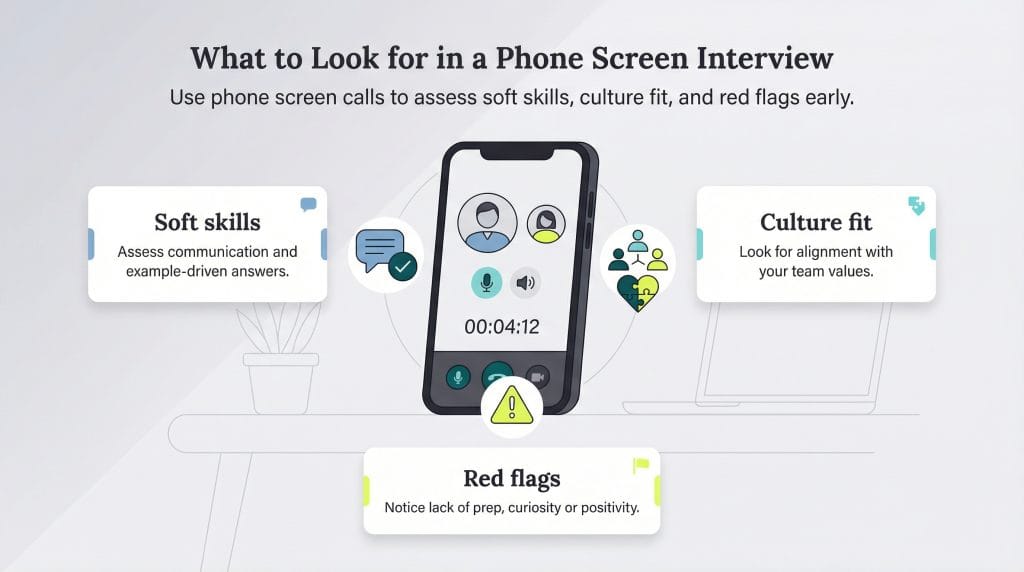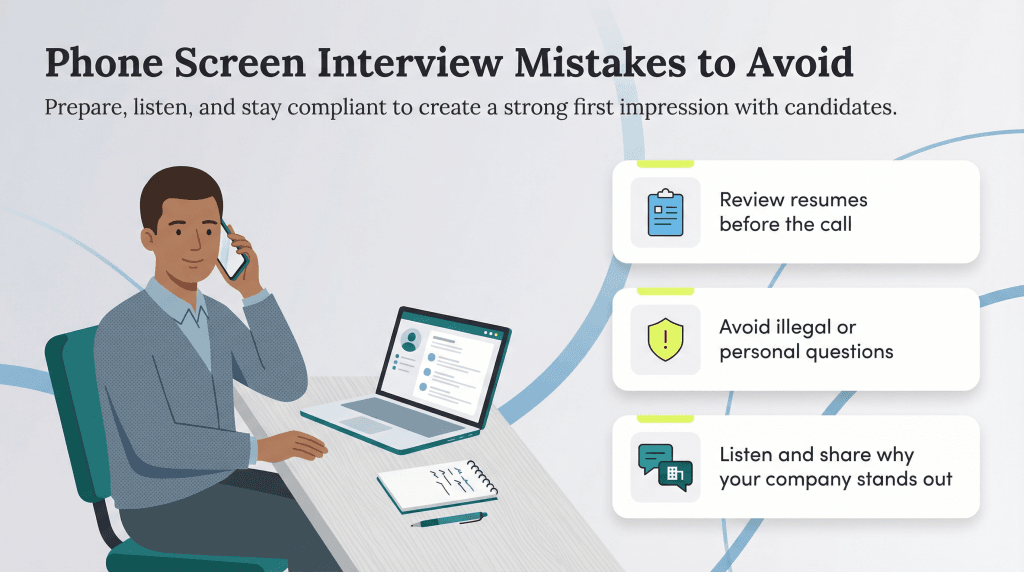Phone screening is an important part of hiring new employees. It is the first brief interview conducted with a job candidate. Employers use these phone calls to see who will move on to the next stage of the hiring process — the formal interview.
When done the right way, phone screens simplify your recruiting process. Don’t just rush through the screening phase to move on to the formal job interview though. This first step provides value in hiring the right candidate for an open position. Additionally, this interaction is often a candidate’s first experience with your organization and can leave a lasting impression.
How to conduct a phone screen interview
Phone screens work best when you have a specific interview process. Although it can feel repetitive to conduct multiple screenings back-to-back, you should make the interviews as consistent as possible. Give all candidates the same level of attention. Ask them a uniform set of questions. This will help you get a fair comparison of who should move on to the next round of interviews.
Here are five steps to conduct a phone screen interview:
- Prepare for the interview
- Schedule the interview
- Introduce yourself
- Ask the phone screening questions
- Ask if they have questions for you
- Explain the next steps
1. Prepare for the interview.
Preparation is one of the keys to conducting a successful phone screening. For example, there are several details about the job opening you should determine beforehand.
Alain Stefan Dalencourt, talent partner at AI TalentFlow, said both the hiring manager and the recruiter handling the interview should “understand the technical need for the position, how the business will be impacted if they hire or don’t hire for the position, how soon the position needs to be filled, and which skills are essential vs. nice to have.”
You should also research the person you are meeting. Read their resume, scan their LinkedIn profile, and check for common contacts to get a feel for their experience and network. However, be careful when looking at a candidate’s social media presence, as what you see may lead to unintentional bias.
Everyone holds positive and negative unconscious biases about certain groups of people. One way to prepare for a phone screen is to understand your implicit biases so you don't unintentionally discriminate against a candidate during the hiring process.
2. Schedule the interview.
When you schedule the phone screening, be mindful of the applicant’s time. Although the interview will be brief, the candidate may have prior obligations, such as work and child care, that limit the times they can meet with you. This may mean the screening occurs after standard work hours. Give the candidate the same courtesies you would expect them to give you. Respond to them promptly, and answer any preliminary questions they may have.
3. Introduce yourself.
When you first meet the job applicant, formally introduce yourself and explain how the screening process will go.
4. Ask the phone screening questions.
Start by getting to know the candidate, and then jump into the question portion of the interview. Ask every candidate the same set of questions. This will help you avoid bias or unfair evaluations. Conduct the interview in a quiet, professional setting, and give the candidate your full attention. With each question, listen carefully to the responses and note any red flags.
Don’t ask illegal questions on race, color, national origin, religion, sexual orientation, gender identity, disability, age, pregnancy or marital status.
5. Ask if they have questions for you.
A job candidate is interviewing you just as much as you are interviewing them, so give them a forum to ask questions. A well-prepared candidate will have at least one question for you. The questions they ask can tell you more about who the candidate is and how interested they are in the company.
“You should allow time for the candidate to ask a question or two,” Paul McDonald, CEO at PCMC Group and former senior executive director at staffing agency Robert Half, told business.com. “That shows how prepared they are, how curious they are and if they are a good cultural fit.”
6. Explain the next steps.
At the end of the phone screening, let the candidate know what to expect. Tell them when they will hear from you and whom to contact for follow-ups. If the interview didn’t go well, help them with how they answer a question, how they frame an interview answer or how they think about questions.
“I want to make sure that the candidate is always getting something back for their time spent with me, whether it’s an opportunity to speak with the hiring manager or some areas of improvement for their next call with our team or other job opportunities,” Dalencourt said.
The
best HR software can help businesses navigate the recruitment process, including tracking applicants and interview assessments.
Best phone interview questions
If you ask the right interview questions, the answers will give you a good idea of whether the candidate should move on to the next round of interviews. To get the most out of the process, ask open-ended questions; such queries allow the candidate to break down their step-by-step process for solving specific challenges.
You can touch on the employee’s technical skills and experience, but you should look at the candidate’s soft skills at this stage of the interview process. McDonald listed five topics to cover in a phone screening: foundational questions, position interest, company interest, skills and experience, and salary expectations.
In this interview, McDonald explains the five types of questions to ask during a phone screen interview.
Foundational “get to know you” questions
Start by asking the candidate basic “get to know you” questions, which help to break the ice and give insight into the candidate. Here are some examples of questions you can ask:
- Can you tell me about yourself?
- Why are you leaving your current position?
- What are your greatest strengths and weaknesses?
- What type of work environment do you prefer?
- What does DEI (diversity, equity and inclusion) mean to you?
Position interest
Next, move on to questions regarding the candidate’s interest in the position. Here are some questions to ask:
- What attracted you to this position?
- How did you hear about this position?
- Why did you pick the career you’re in?
- How quickly are you looking to move into this position?
Company interest
Next, ask questions that test the candidate’s knowledge of the company and their interest in it. A well-prepared candidate will have researched your organization. Here are some sample questions to ask:
- What attracted you to this company?
- How many other interview processes are you involved with?
Skills and experience
Ask questions that allow the candidate to go into detail about their skills and experience. You can touch on some technical skills, but these questions should be geared mostly toward identifying the candidate’s soft skills.
“What you’re looking for here, as an employer, is if the candidate can articulate the projects that are relevant … always showing the benefit (or return on investment) to the company or organization they are/were a part of,” McDonald said. Here are some examples of questions to ask. Can you tell me about:
- A time you demonstrated leadership?
- One challenge you faced and how you overcame it (step-by-step).
- A time you made a mistake?
- Why you think you are a good match for this position?
Salary expectations (if permitted)
You should address this topic tactfully. But, if your state laws and regulations permit you to, you can inquire about the candidate’s total compensation expectations. Avoid asking a candidate about their salary history, as this is increasingly considered a poor policy and is even illegal in some states. However, if the state allows, you can ask a simple question to gauge compensation alliance, such as “What is your target compensation?”
California, Colorado, Connecticut, Illinois, Maryland, Nevada, New York, Rhode Island and Washington have salary range transparency laws in effect. Plus, several other states are considering something similar. If you post appropriate salary ranges on your job postings, you may not necessarily need to ask about candidate salary expectations at this point, as they are likely OK with the range you posted.
What to look for during a phone screen interview
During the phone screen interview, you are gauging a candidate’s soft skills and how they conduct themselves. You obviously want to identify if their skills and expertise will potentially match up with the role, but that will be addressed more heavily in the formal job interview. The screening interview is a chance to determine their soft skills and if they would be a solid cultural fit for the organization and team.
“Listen to how they’re conducting themselves,” McDonald said. “Are they organized? Are they comfortable on the phone? Are they listening to the question? Are they answering the question? Can they give you examples?”
Also, pay attention to any warning signs. McDonald said three of the biggest red flags are a lack of preparedness, a lack of curiosity and negativity about former employers.
Follow these steps for a successful phone screen and ask the right questions. This way, you’ll be on your way to narrowing down your list of applicants to the best potential candidates for the role and your organization.
While it may sound outrageous, recent advancements in AI and other technology have led some companies to accidentally hire deepfakes and scammers. The screening process is a great time to filter out any nefarious or false applicants.
Mistakes to avoid during a phone screen interview
Just as you are evaluating candidates, they are evaluating you. This is likely one of their first experiences with your company, so you want to make a good impression. In addition to helping you attract talented candidates, a good phone screen interview will help you identify the best candidates for the job.
Blunders in a phone screen interview can derail your entire recruitment process. Here are five major mistakes to avoid during the phone screen interview:
- Not preparing adequately: Just as a candidate should prepare, interviewers should review the candidate’s resume and job application beforehand. Being unprepared can lead to a lack of meaningful conversation and hinder effective evaluation.
- Asking illegal or inappropriate questions: It’s crucial for interviewers to be aware of legal and ethical boundaries. Asking questions related to a candidate’s age, gender, marital status, race, religion or other protected characteristics is not only inappropriate but also illegal in many places.
- Overloading the interview: Trying to cover too many topics or questions quickly can overwhelm the candidate and prevent in-depth responses. Focus on a few key questions that will provide valuable insights. We offered several sample questions in this article, but that doesn’t mean you must ask all of them. It’s also important to leave time at the end for the candidate’s questions.
- Not actively listening: Rushing through questions without listening to the candidate’s responses can lead to missed opportunities to learn about their qualifications and potential fit. Actively engaging in the phone screen conversation shows respect and interest.
- Neglecting to sell the company: A phone screen interview is a two-way street. If you want to attract the best candidates, you must use it as an opportunity to showcase your company as an attractive employer. Failing to highlight the company culture, expectations, growth opportunities and benefits might deter strong candidates.
Avoiding these mistakes ensures that the phone screen interview is a positive experience for both the employer and the candidate. It can help your company accurately evaluate candidates while leaving a lasting positive impression on potential employees.
Source interviews were conducted for a previous version of this article.











